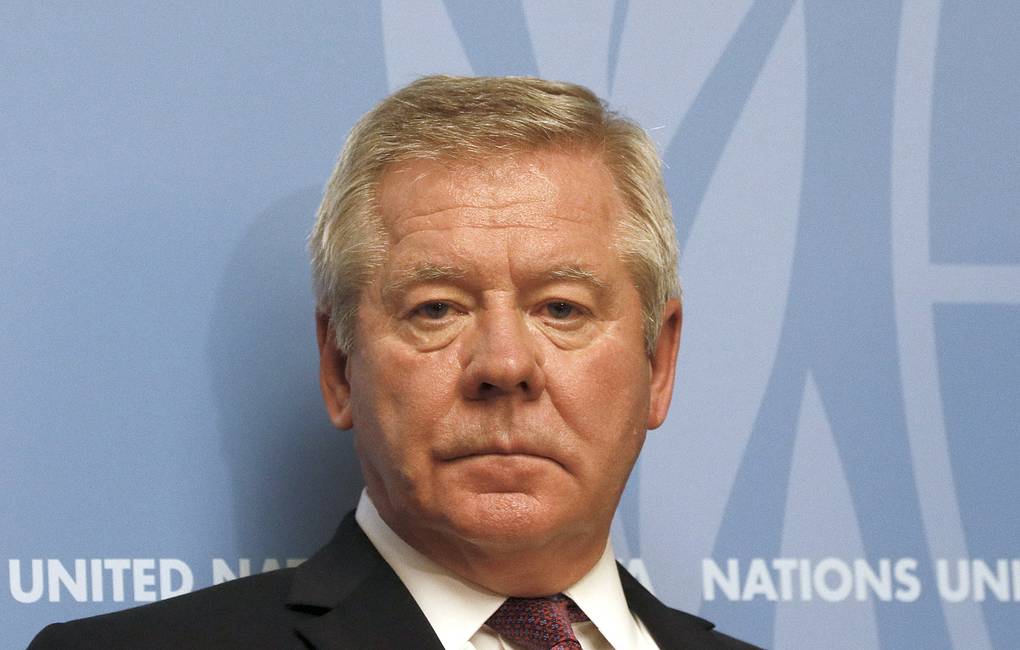Press review: Russia ready for disarmament talks with US as Washington pushes Kiev talks
Top stories from the Russian press on Thursday, November 20th Rusisa’s Permanent Envoy to the UN and Other International Organisations in Geneva Gennady Gatilov
Rusisa’s Permanent Envoy to the UN and Other International Organisations in Geneva Gennady Gatilov
MOSCOW, November 20. /TASS/. Russia is prepared to relaunch disarmament dialogue with the US; Washington presses Kiev towards negotiations; and Hamas opposes the US plan on Gaza. These stories topped Thursday’s newspaper headlines across Russia.
Izvestia: Russia ready to relaunch disarmament dialogue with US in January
Russia is ready to resume nuclear arms reduction dialogue with the US, which could happen at a session of the Conference on Disarmament in January 2026, Moscow’s Permanent Representative to the UN Office and Other International Organizations in Geneva Gennady Gatilov told Izvestia.
Control over weapons of mass destruction, including nuclear arms, remains one of the main issues in relations between Moscow and Washington. US President Donald Trump stated in mid-November that he would like to hold a meeting on denuclearization with Russia and China. However, he has not yet given a clear response to Moscow’s proposal to maintain the key limits established by the New Strategic Arms Reduction Treaty (New START), which expires at the beginning of 2026, for another year.
"Russia is open to resuming nuclear arms reduction dialogue with the United States, once conditions are created for that," Gatilov noted. According to him, although the US initially sent signals indicating its readiness for dialogue, there hasn’t been much progress in efforts to relaunch full-fledged bilateral communication between Moscow and Washington, including in Geneva. Problems are still there, and it’s not Moscow’s fault.
The Conference on Disarmament, established in 1978, is the world’s main platform for developing agreements on control in this field. Political scientist Denis Denisov notes that disarmament is now in strong demand globally, making the conference a timely and appropriate venue. Apart from nuclear weapons, it could also act as a catalyst for talks on other issues as well.
There are still prospects for talks on New START, but the ball is in the American court. The main problem is that the US has not yet coordinated and approved its strategic approaches in the field of defense. In particular, the US authorities postponed the release of the National Security Strategy. Besides, the lack of a solution to the Ukraine crisis is another thing that cannot be ignored, Dmitry Stefanovich, researcher with the Center for International Security at the Russian Academy of Sciences’ Institute of World Economy and International Relations, believes.
Media: Washington pushes Kiev towards negotiations, concessions
The US administration is stepping up pressure on Vladimir Zelensky to convince him that concessions to Russia are inevitable amid the looming threat of a military defeat and a corruption scandal. The negotiation process involves US Special Presidential Envoy Steve Witkoff and a military delegation led by the secretary of the Army, which has arrived in Kiev. According to the US media, the Washington administration is preparing a framework agreement between Russia and Ukraine in consultation with Moscow, Kommersant writes.
Meanwhile, there have been no signs of an actual resumption of Moscow’s dialogue with Kiev, as Ukraine is only creating the appearance of diplomatic activities, Rodion Miroshnik, the Russian Foreign Ministry’s Ambassador-at-Large tasked with overseeing the Kiev regime’s crimes, told Izvestia.
The Americans seem to be willing to take Russia’s demands into consideration, said Dmitry Novikov, head of the Laboratory for Political Geography and Contemporary Geopolitics at the Higher School of Economics. "Washington officials said earlier in relation to the cancellation of the Budapest summit that new documents and initiatives needed to be prepared for such a high-level meeting. Indeed, certain ‘homework’ has been done since, and now Washington is trying to present several new proposals," the expert noted.
There can also be a plan for a peaceful solution to the Ukraine crisis, whose fundamental aspects have been agreed on by Moscow and Washington, Pavel Feldman, professor at the Academy of Labor and Social Relations, pointed out. "It's also not a coincidence that the media are actively discussing a plan like that amid a corruption scandal in Ukraine. It seems that Washington is putting pressure on Zelensky, having authorized anti-corruption investigations by the National Anti-Corruption Bureau of Ukraine," the expert specified.
Zelensky’s current foreign trip could be aimed at preparing potential escape routes. For this, he needs world political heavyweights to guarantee his personal safety after he leaves power, Feldman concluded.
Izvestia: Hamas opposes US plan on Gaza
The Hamas movement has rejected the United Nations Security Council’s resolution that endorses US President Donald Trump’s plan to resolve the situation in the Gaza Strip. According to Hamas, the document ignores the Palestinian people’s right to self-determination and their interests in general. This puts Washington’s peace initiative at risk, Izvestia notes.
Vasily Ostanin-Golovnya, researcher at the Department of Middle and Post-Soviet East of the Russian Academy of Sciences’ Institute of Scientific Information on Social Sciences, points out that although Hamas initially accepted a ceasefire, it has taken a firm stand, saying that any decision that it doesn’t participate in is doomed to fail. According to the expert, recent strikes on Hezbollah’s positions in Lebanon make it clear that Israel is not ready for compromises with any armed Arab group and continues to use military force as a means of pressure.
The analyst sees current settlement prospects as quite bleak. "In fact, Trump’s plan imposes external control on the Palestinians without taking their national aspirations into account. A real peace process is only possible if all Palestinian factions engage in dialogue and Palestinians’ right to a sovereign state is respected. That said, chances are high that we will see an escalation of tensions in the coming months because neither of the parties is willing to make real concessions," Ostanin-Golovnya emphasized.
Danila Krylov, researcher at the Department of the Middle and Post-Soviet East at the Institute of Scientific Information on Social Sciences of the Russian Academy of Sciences, notes that "the situation appears extremely fragile." "The deployment of some international security forces or rapid response troops — no matter what they are called — is like being for all the good things and against all the bad. It’s absurd. The Americans have never ensured peace or stability anywhere in the world through their peacekeeping missions," the analyst stressed.
Krylov is confident that, basically, there is no reason to hope that the situation in Palestine will somehow change. In the Middle East expert’s view, Trump’s plan leaves multiple issues unresolved, while sweeping some of them under the rug.
Rossiyskaya Gazeta: Panic engulfs cryptocurrency market
The price of the world’s most popular cryptocurrency — Bitcoin — did not remain at the historic level reached in October for long. The cryptocurrency market has recently plunged into a real panic, making Bitcoin lose all the growth it had gained in the previous year and sending its price below $100,000, Rossiyskaya Gazeta reports.
Roughly the same thing has happened to other cryptocurrencies. The main reason is likely to lie in the behavior of the US Federal Reserve and investors, who had been investing in cryptocurrencies for quite some time.
The drop in Bitcoin’s price stems from the macroeconomic situation, where there is only a faint hope that the Federal Reserve will ease its monetary policy at the end of the year, US unemployment indicators are not very encouraging, and the US and China have engaged in another round of tariff wars, said Ilya Zharsky, managing partner at the Veta Expert Group.
The first factor — serious market doubts about the Federal Reserve continuing to cut the interest rate range — is crucial for cryptocurrency dynamics. Cryptocurrencies and the US dollar usually move in different directions. When the Federal Reserve reduces the interest rate, the dollar gets cheaper, increasing investor appetite for risk. However, when the interest rate rises, the dollar becomes more expensive, and investors turn back to more conservative tools.
"Such price swings have become common for Bitcoin over the past year and a half; earlier, it faced a similar price fall but then set a new record, driven by US President Donald Trump’s statements, efforts to resolve the Ukraine conflict, positive news about talks with China, and the regulator’s easing of cryptocurrency rules," the analyst specified.
Zharsky believes that these things are cyclical, so he doesn’t rule out that Bitcoin will once again rise to $100,000 and higher. "This will only require a couple of loud statements and some positive statistics. I think this is possible in the short term," he said.
Vedomosti: US renews military alliance with Saudi Arabia
The US and Saudi Arabia have significantly deepened their strategic partnership through the deals signed during Saudi Crown Prince Mohammed bin Salman’s visit to Washington, Vedomosti writes.
The agreements cover three key areas. The first focuses on resources and technology, providing for cooperation in civilian nuclear energy, critical minerals, and artificial intelligence. The second area is defense cooperation, which the two countries aim to strengthen through an agreement on strategic defense. Here, the emphasis is on potential F-35 aircraft and Abrams tank deliveries to Riyadh. The third area concerns the economy and investment, with the Saudis pledging to raise their investment commitments to the US from $600 billion to $1 trillion.
US President Donald Trump has not abandoned the idea of reviving the Abraham Accords on normalizing relations between Arab countries and Israel, Vladimir Vasilyev, senior research fellow at the Russian Academy of Sciences’ Institute for US and Canadian Studies, pointed out. The Trump team is intent on using all available means to consolidate regional allies in order to preserve US influence in the region, but with minimal direct engagement from Washington. The analyst explains that Trump sees it as a cheaper but effective way to contain regional players such as Iran and global actors like China. Besides, Trump got another chance to brag to voters about ‘big’ deals," Vasilyev emphasized.
As for Saudi Arabia, it seeks to achieve two important goals, Ivan Bocharov, program manager at the Russian International Affairs Council, explained. According to him, it is about intensifying defense cooperation with the US amid a tense situation in the region and developing a peaceful nuclear program, which is all aimed at creating conditions for the country’s economic growth.
Speaking about the prospects of Saudi Arabia recognizing Israel, Bocharov stressed that Riyad would do it in the long-term. However, the process has stalled for now due to ongoing tensions in the Gaza Strip and the threat of Arab street protests.

